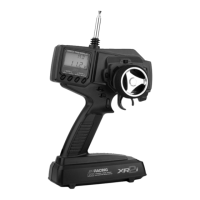8
RC Safety Precautions
Transmitter Crystal Replacement Notice
For safe and reliable performance of your RC model,
please carefully read and follow the guidelines below.
1. Radio control models are not toys. They are
capable of inflicting serious injury to people and
property. Use caution at all times when operating
your model.
2. You are responsible for the safe operation of your
RC model. You must properly install, test and
operate your model with a clear sense of that
responsibility. Do not take risks that might
endanger yourself or others.
3. Running an RC car in the streets is very dangerous
to both drivers and models. Avoid running your
model in areas occupied by full-size automobiles.
To locate areas where you can safely operate your
model, contact your local hobby shop for RC tracks
or clubs in your area.
4. When running an RC boat, keep it away from any
swimmers, full-size boats and wildlife. Also, watch
carefully for fishing lines that may get tangled in
the propeller.
5. Before operating your model, make sure your
frequency is clear. If someone else is operating on
the same frequency, both models will go out of
control, possibly causing damage to the models, as
well as others.
6. If at any time while operating your RC model you
sense abnormal model functioning, end your
operation immediately. Do not operate your model
again until you are certain the problem has
been corrected.
Caution: Control of your model is impossible
without sufficient voltage for the transmitter and
receiver. A weak transmitter battery will decrease
your range of operation, and a weak receiver bat-
tery will slow servo movement and decrease
your range of operation. Check your receiver
pack voltage often to avoid losing control of your
model. When using a model that operates both
the electric motor and the receiver from the
same battery (Battery Eliminating Circuitry or
BEC), you should discontinue use when the top
speed sharply decreases or you'll quickly lose
control of your model.
The Federal Communications Commission (FCC)
requires that changes in transmitter frequency
must be performed only by an authorized service
technician (Horizon Service Center). Any transmitter
frequency changes made by a non-certified
technician may result in a violation of FCC rules.
Crystal

